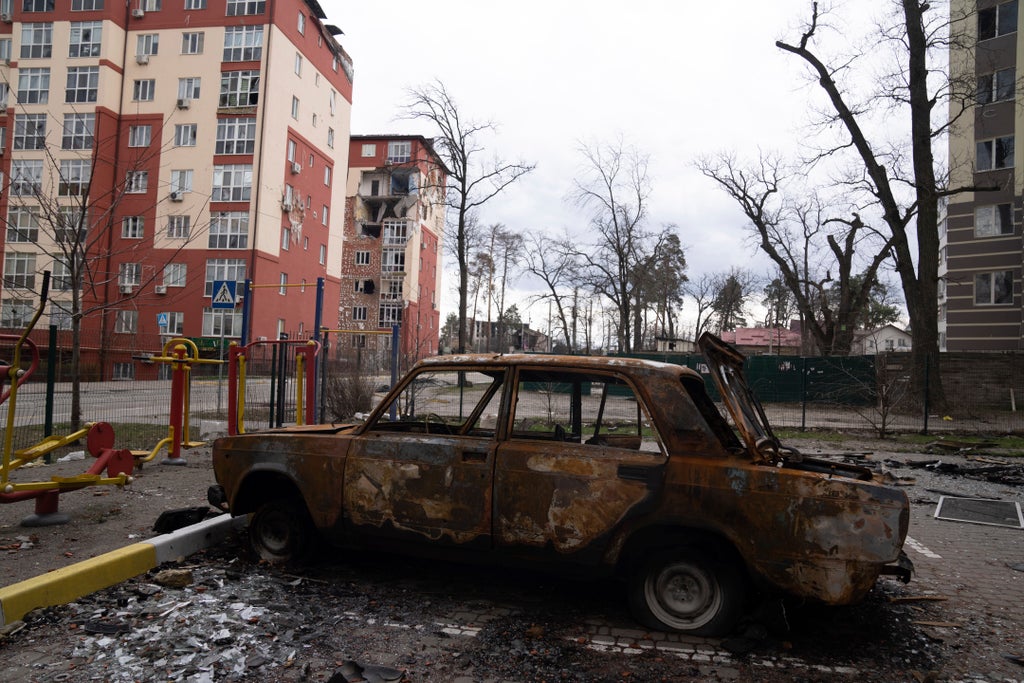
A spokesman for Moscow-backed separatists in eastern Ukraine has denied using chemical weapons to uproot Ukrainian troops in the port city of Mariupol.
Eduard Basurin was quoted by the Interfax news agency as saying Tuesday that the separatist forces “haven’t used any chemical weapons in Mariupol.”
Basurin’s assertion followed his statement Monday on Russian state TV that the separatists will use “chemical troops” against Ukrainian soldiers holed up at reinforced positions at a giant steel factory in Mariupol “to smoke them out of there.”
A Ukrainian unit defending Mariupol claimed without providing evidence that a drone had dropped a poisonous substance on its positions. It indicated there were no serious injuries.
___
KEY DEVELOPMENTS IN THE RUSSIA-UKRAINE WAR:
— Mayor: More than 10,000 civilians dead in Ukraine port city
— ‘It’s not the end’: The children who survived Bucha’s horror
— Russian war worsens fertilizer crunch, risking food supplies
— Czechs provide free shooting training for local Ukrainians
— Go to https://apnews.com/hub/russia-ukraine for more coverage
___
OTHER DEVELOPMENTS:
TOKYO — Japan’s Cabinet has approved additional sanctions against Moscow. They include as a freeze on assets of nearly 400 individuals including Russian President Vladimir Putin’s two daughters, as well as a ban on new investments and vodka imports.
The new sanctions approved Tuesday include a freeze on assets of 398 Russian individuals, who also include Foreign Minister Sergey Lavrov’s wife and daughter. Japan has now frozen assets of more than 500 Russian individuals and organizations.
Japan’s new measures also include freezing the assets of major banks Sberbank and Alfa Bank, as well as 28 other Russian organizations such as those linked to military businesses. The measure for the banks will take effect on May 12.
Japan will ban new investment and Russian imports including vodka, wine, lumber and auto parts beginning next week.
Tuesday’s approval covers part of a list of sanctions announced last Friday by Prime Minister Fumio Kishida, who also proposed phasing out Russian coal and other fossil fuel imports.
___
LONDON — A senior British defense minister says “all possible options are on the table” for the West’s response if Russian forces use chemical weapons in Ukraine.
Armed Forces Minister James Heappey said Tuesday that neither the U.K. nor the Ukrainian governments had confirmed reports that a chemical weapon may have been used in the besieged city of Mariupol.
Heappey told Sky News that “there are weapons that simply should not be used, and if they are used people will be held to account.”
He said: “I think it’s useful to maintain some ambiguity ... over exactly what the response would be, but let’s be clear, if they are used at all then President Putin should know that all possible options are on the table in terms of how the West might respond.”
Britain’s defense ministry says Russia continues to redeploy its forces for a push on eastern Ukraine, and fighting is expected to intensify there over the next two to three weeks. It says Russian forces are withdrawing from Belarus in order to redeploy in support of operations in eastern Ukraine.
___
KIAMBU COUNTY, Kenya — Russia’s war in Ukraine has pushed up fertilizer prices that were already high, made scarce supplies even harder to find and pinched farmers, especially those in the developing world.
Higher fertilizer prices are making the world’s food supply more expensive and less abundant, as farmers skimp on nutrients for their crops and get lower yields.
While the ripples will be felt by grocery shoppers in wealthy countries, the squeeze on food supplies will land hardest on families in poorer countries. The fertilizer crunch threatens to further limit worldwide food supplies, already constrained by the disruption of crucial grain shipments from Russia and Ukraine.
___
UNITED NATIONS — The U.N. children's agency says that nearly two-thirds of all Ukrainian children have fled their homes in the six weeks since Russia’s invasion and the United Nations has verified the deaths of 142 youngsters although the number is almost certainly much higher.
Manuel Fontaine, UNICEF’s emergency programs director who just returned from Ukraine, said Monday that having 4.8 million of Ukraine’s 7.5 million children displaced in such a short time is something he hadn’t seen happen so quickly in 31 years of humanitarian work.
Ukraine’s U.N. ambassador, Sergiy Kyslytsya, claimed Russia has taken more than 121,000 children out of Ukraine and reportedly drafted a bill to simplify and accelerate adoption procedures for orphans and even those who have parents and other relatives.
Most of the children were removed from the besieged southern port city of Mariupol and taken to eastern Donetsk and then to the Russian city of Taganrog, according to Kyslytsya.
Fontaine said that of Ukraine’s refugee children, 2.8 million are displaced within Ukraine and 2 million more are in other countries.







